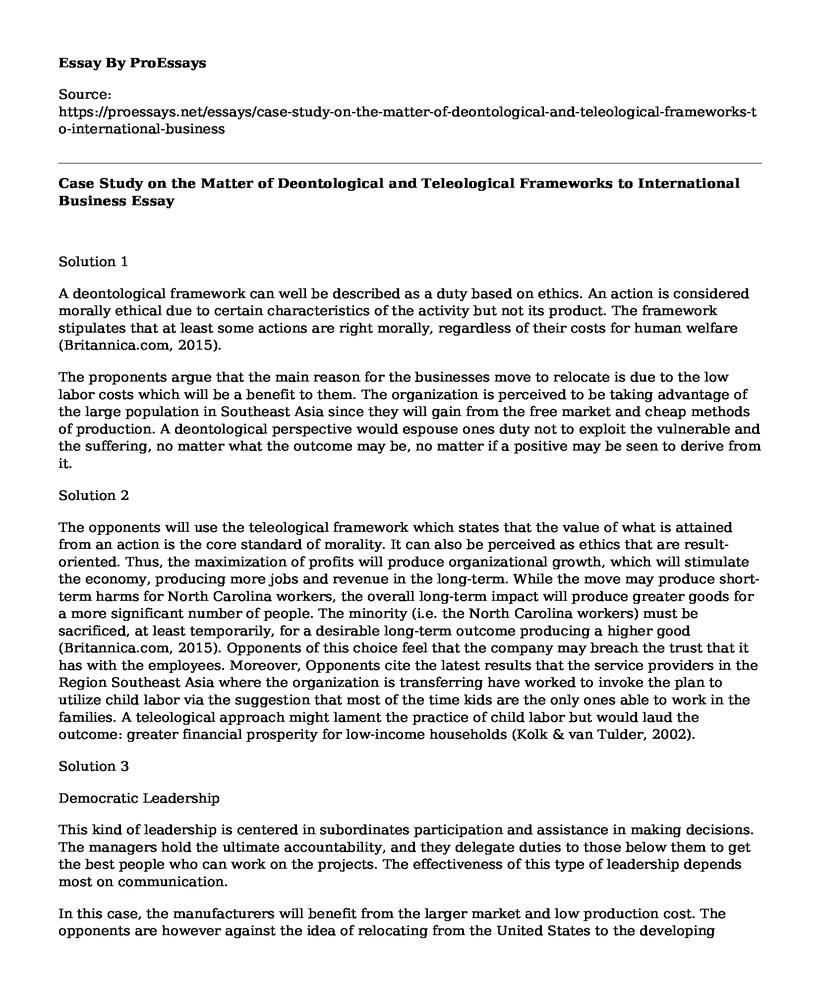Solution 1
A deontological framework can well be described as a duty based on ethics. An action is considered morally ethical due to certain characteristics of the activity but not its product. The framework stipulates that at least some actions are right morally, regardless of their costs for human welfare (Britannica.com, 2015).
The proponents argue that the main reason for the businesses move to relocate is due to the low labor costs which will be a benefit to them. The organization is perceived to be taking advantage of the large population in Southeast Asia since they will gain from the free market and cheap methods of production. A deontological perspective would espouse ones duty not to exploit the vulnerable and the suffering, no matter what the outcome may be, no matter if a positive may be seen to derive from it.
Solution 2
The opponents will use the teleological framework which states that the value of what is attained from an action is the core standard of morality. It can also be perceived as ethics that are result-oriented. Thus, the maximization of profits will produce organizational growth, which will stimulate the economy, producing more jobs and revenue in the long-term. While the move may produce short-term harms for North Carolina workers, the overall long-term impact will produce greater goods for a more significant number of people. The minority (i.e. the North Carolina workers) must be sacrificed, at least temporarily, for a desirable long-term outcome producing a higher good (Britannica.com, 2015). Opponents of this choice feel that the company may breach the trust that it has with the employees. Moreover, Opponents cite the latest results that the service providers in the Region Southeast Asia where the organization is transferring have worked to invoke the plan to utilize child labor via the suggestion that most of the time kids are the only ones able to work in the families. A teleological approach might lament the practice of child labor but would laud the outcome: greater financial prosperity for low-income households (Kolk & van Tulder, 2002).
Solution 3
Democratic Leadership
This kind of leadership is centered in subordinates participation and assistance in making decisions. The managers hold the ultimate accountability, and they delegate duties to those below them to get the best people who can work on the projects. The effectiveness of this type of leadership depends most on communication.
In this case, the manufacturers will benefit from the larger market and low production cost. The opponents are however against the idea of relocating from the United States to the developing nation. The proponents of a decision, however, have feelings of acclamation, due to creativity, equality, competence and integrity over the decision.
Solution 4
The level of corporate responsibility reflected in this decision
Just like any other person or business, corporations should be active in the society and not commercial facilities. Humanitarian responsibility is a role to be performed by organizations. The general public feels that it is the responsibility of corporations to offer services such as giving resources, lending money to the poor and assisting those affected by natural calamities. The officials, however, are keen to point out to the critics of this move that most of the time; children are the only ones in a position to provide and also work. Thus refuting them would be unfavorable to the population. The manufacturer therein is supposed to help boost the economy by providing resources for education and sponsorship to the children in the labor force.
Reference
Britannica.com. (2015) Deontological ethics: philosophy. Retrieved from https://www.britannica.com/topic/Deontological-ethics
Britannica.com. (2015) Teleological ethics: philosophy. Retrieved from https://www.britannica.com/topic/teleological-ethics
Kolk, A. & van Tulder, R. (2002). Child labor and multinational conduct: A comparison of international business and stakeholder codes. Journal of Business Ethics, 36, 291-301.
Cite this page
Case Study on the Matter of Deontological and Teleological Frameworks to International Business. (2021, Apr 09). Retrieved from https://proessays.net/essays/case-study-on-the-matter-of-deontological-and-teleological-frameworks-to-international-business
If you are the original author of this essay and no longer wish to have it published on the ProEssays website, please click below to request its removal:
- Free Will, God, and Evil in Philosophy Essay Example
- Society Needs Laws - Essay Sample
- Assignment Example on Intercultural Communication
- Research Paper on Use of the PMIS Software
- Essay on Maximizing Impact: Koe Koe Tech Develops Sustainable Goals for Social Entrepreneurship
- Essay Sample on Gender Stereotypes: The Titanic's 50-50 Parity Goal
- Paper Example on American Factory: Hope and Frustration in Uneasy Union







